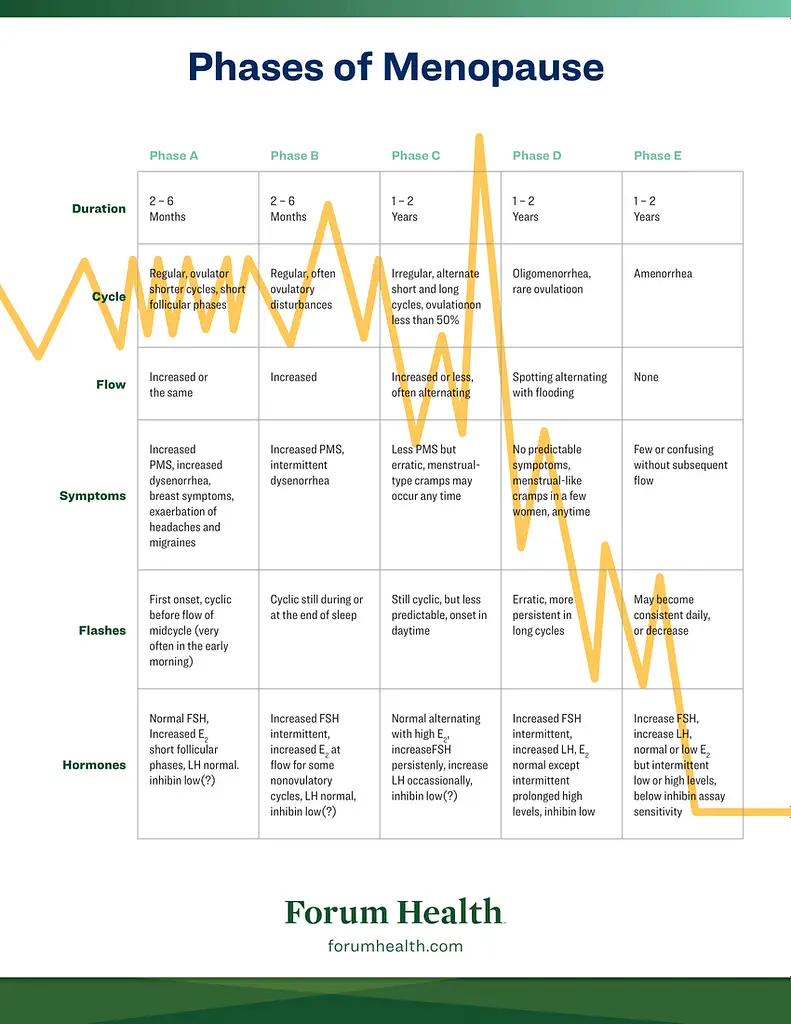Menopause is a natural transition that every woman goes through, and it marks the end of reproductive years and brings about various changes in the body. Understanding the different phases of menopause is essential to navigate this transformative journey with greater ease and awareness.
Knowing what to expect in every stage can make this important life transition a little less stressful and serve as a guide as you navigate menopause. We’ve identified five key phases that most women experience and the duration, menstrual cycle changes including flow, symptoms, hot flashes and changes in hormones.
The five phases of menopause and what to expect during each one.
Phase A:
Women are typically in this phase for two to six months. During this phase, menstrual cycles are generally regular, and women experience no significant menopausal symptoms. The ovulation phase is shorter, as well as the follicular phase. The flow will likely remain the same or can increase a bit.
Common symptoms in pre-menopause include increased PMS, increased dysmenorrhea, breast health symptoms, headaches and migraines. Hot flashes are beginning and cyclic before your flow, typically in the early morning.
FSH hormone levels remain normal with an increase in estrogen and normal luteinizing hormone.
Phase B:
This phase again lasts between 2 and 6 months for most women. Cycle and flow continue to be regular, but you may experience an increase in ovulatory disturbances and an increase in flow.
Most common symptoms include increased PMS and intermittent dysmenorrhea, with cyclic hot flashes occurring during or at the end of sleep.
FSH hormone increases, estrogen can increase intermittently, and luteinizing hormone remains normal.
Phase C:
This phase lasts one to two years for most women and is characterized by increased changes throughout the body. Your cycle begins to become irregular, alternating from short to long, and ovulation at less than 50% with flow becoming either heavier or lighter.
Signs of PMS may decrease but become more erratic and menstrual cramps become more common and may occur at anytime.
Common symptoms include hot flashes, night sweats, mood changes, sleep disturbances, vaginal dryness, decreased libido, urinary problems, and changes in skin and hair. You may also experience cognitive changes and bone density loss.
Hormones alternate between normal and high estrogen, increases in FSH and occasionally lower luteinizing hormone.
Phase D:
Lasting one to two years, ovulation becomes rare during this phase and oligomenorrhea may begin, which is irregular and inconsistent menstrual blood flow. It’s common to experience alternating spotting and flooding of menstrual flow.
Menstrual-like cramps may continue but are less common. Hot flashes are erratic and more persistent in long cycles. Hormone changes continue with an increase in FSH and luteinizing hormone, estrogen should be about normal with prolonged high levels and inhibin low.
Phase E:
In the final phase of menopause, which can last one to two years, women experience amenorrhea or the absence of a menstruation and complete stop to their flow. Symptoms significantly lessen, but some may still be present. Hot flashes may still be consistent daily or decrease.
Hormone changes include an increase in FSH, increase in luteinizing hormone, normal or low estrogen, and alternating levels of inhibin.

Menopause Care and Guidance Personalized to You
Understanding the phases of menopause empowers women to navigate this natural transition with greater knowledge and preparedness. From pre-menopause to late post-menopause, each phase brings unique challenges and experiences.
By recognizing the duration, symptoms, and changes in menstrual flow associated with each phase, you can seek appropriate medical guidance and make informed decisions about your health and well-being during this transformative journey. Remember, every woman’s experience of menopause is unique, so it’s crucial to consult with a Forum Health provider to tailor the best approach for your individual needs.






